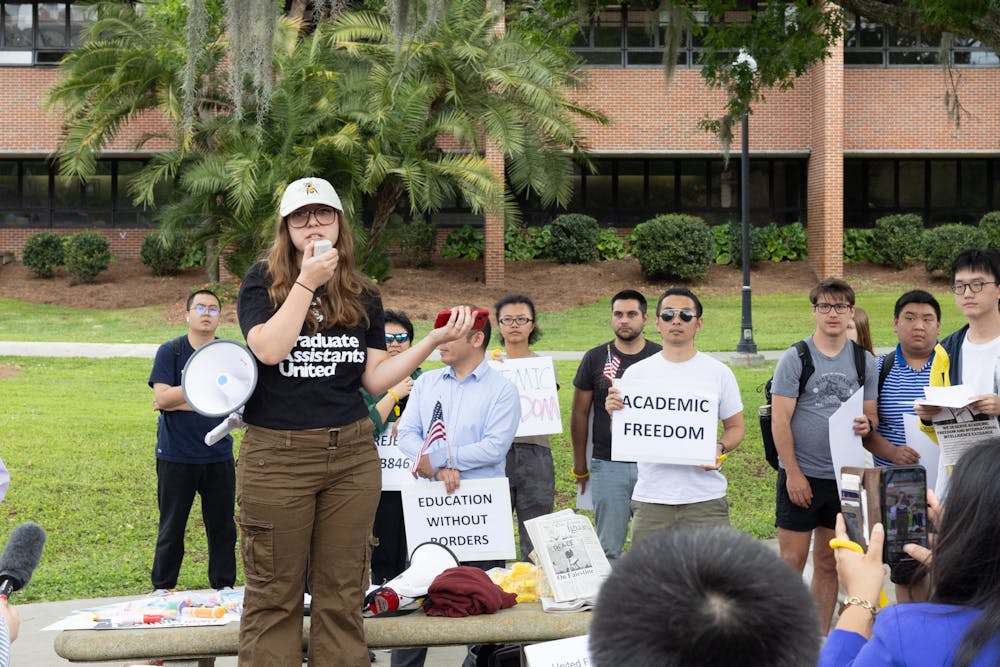As protest speakers climbed one by one atop a picnic table to address a crowd of 200 gathered in the Reitz Union courtyard Tuesday afternoon, their words were met not with claps or cheers, but with the sound of plastic whistles blasting.
The Florida Chinese Faculty Association organized the protest in response to the Florida Board of Governors meeting taking place at UF Tuesday and Wednesday in the Reitz Student Union.
The FCFA gathered to denounce Senate Bill 846, which bans “partnerships,” including recruitment programs, between state universities and any non-U.S. citizen living in one of seven countries of “concern:” China, Iran, Venezuela, Russia, Cuba, Syria and North Korea. The law was passed in May and went into effect Dec. 1.
Before the event, organizers passed out plastic bags holding yellow whistles reading “WE BELONG.” The protestors clutched the whistles alongside signs bearing phrases like “We make UF, you make the crisis” and “Education without borders.”
Protestors ranged from students wearing jeans to faculty in suits and loafers. An oak tree offered shade from the 77-degree weather as protestors gathered underneath it to hear a slate of about 20 speakers.
The FCFA began contacting local and national advocacy groups to help with the event about four weeks ago, said the group’s secretary, UF materials science and engineering professor Jiangeng Xue. The FCFA was founded more than 10 years ago to foster Chinese collaboration, but more recently, it’s become a space to fight against discriminatory policy, Xue said.
Xue and his colleagues have already noticed two main effects of the law in the months since it’s been passed, he said. The first is a discriminatory environment, he said.
“It’s kind of like, ‘Hey, you people are not welcome here,’” he said. “We have seen people, faculty members, getting the position, getting the offer, but they don’t want to come here. They didn’t accept the offer because they do not feel like the environment is good for them.”
The law will also lower the quality of graduate students at UF, Xue said.
Faculty across scientific departments are already struggling with low numbers of domestic graduate student applicants, he said. Restricting international recruitment will only worsen the issue, forcing faculty to decrease standards — for example, by lowering GPA requirements.
“We're not going to be seeing the impact right away,” Xue said. “But three, four or five years down the road, we're going to be seeing a decline in the research quality that ultimately is going to affect the reputation of the university.”
Recruiting students based on country of origin rather than academic skills will not only hurt research, but also undergraduates whose classes are taught by graduate students, said Nathan Arndt, a 24-year-old UF materials science and engineering Ph.D. student and member of UF Graduate Assistants United.
“We like having co-workers that are the best at what they do,” he said. “Not only is this law racism and xenophobia disguised as national security, it’s also anti-education.”
Jay Xie, a 20-year-old UF accounting sophomore and president of the UF Chinese Student Association, expressed similar skepticism about the law’s intent.
“I don’t see any people really being harmed or hurt by graduate students doing academic study here, and I just feel like that’s kind of nonsense,” he said. “I feel like national security is just a golden phrase they can use on anything.”
Arash Fahim, an FSU math professor, tried to tell fellow faculty to go ahead and recruit as usual if they didn’t receive any policy from their university, he said. When August came, if they didn’t have enough students, they could simply tell the university they didn’t have enough classes.
But his plan was met with an unexpected roadblock.
“One of them was shaking his head and told me, ‘Actually, we did not have any applicants from those [countries],’” Fahim said. “They already know politicians don’t like them in Florida.”
Leaders from national groups including Asian American Scholar Forum and Asian Americans Advancing Justice spoke alongside university faculty and students at the event.
Gisela Perez Kusakawa, civil rights attorney and executive director of the Asian American Scholar Forum, said AASF came together from a need to give Asian American scholars a voice against laws like SB 846.
“We must make a stand here in Florida and ensure that this is not replicated in other states across the country,” she said. “We must remain vigilant to make sure that history is not repeated and that Asian Americans and Asian immigrants do not continue to be scapegoated as threats.”
Tomorrow, protestors will gather outside the Reitz Union again, this time for a protest on the diversity, equity and inclusion state de-funding order that resulted in UF announcing the firing of 13 full-time DEI roles March 1.
Contact Zoey Thomas at zthomas@alligator.org. Follow her on X @zoeythomas39.

Zoey Thomas is a UF media production senior and the Spring 2026 editor-in-chief of The Alligator. She has previously been data editor and engagement managing editor, as well as a reporter for three semesters. She was also a intern at the Orlando Sentinel. In her sparse free time, Zoey enjoys reading a good book, going for a run or waking up her roommates with the sound of her espresso machine.






